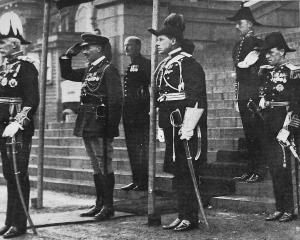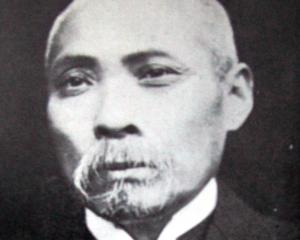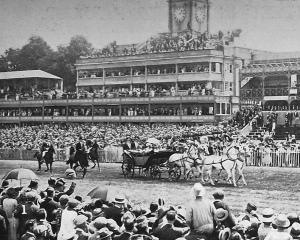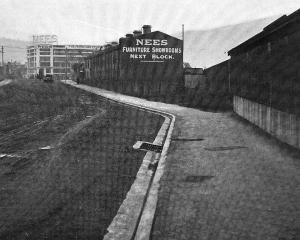The train remained for about a quarter of an hour, and during that time a number of Ashburton young men on the platform came in for a considerable amount of good-natured banter by those on board the train, and some of them were invited "to pass their swags through the window and join the boys''.
Two young men who were noticed escorting young ladies along the platform were specially singled out, and, greatly to the amusement of the onlookers, were told that "their grandmothers would look after the girls for them while they were away''.
Just as the whistle sounded for the train to depart a young lady who was standing near one of the carriage platforms was lifted up and kissed in turn by about half-a-dozen recruits.
To resist was useless, and while the performance was going on the bystanders cheered vociferously.
• A doleful comment was made at the Christchurch Beautifying Association's meeting on Friday, on the tall buildings that are going up in the city.
"I don't know,'' said Mr A. D. Dobson, "what is going to happen. The whole city is built on a crust overlying peat, and if an earthquake comes there will be trouble. The spire of the Christchurch Cathedral came down twice, and will do so again, and with the other tall buildings the same thing will happen. There will be a shake and the top of the building will come down on to the building by its side.''
• "What is the membership of your union?'' asked the president of the Arbitration Court, Mr Justice Stringer, of Mr G. Davis, secretary of the Auckland Drivers' Industrial Union of Workers.
Mr Davis explained that prior to the war the union had 970 members, and was regarded as one of the best organisations in the city.
There had been a considerable reduction in the membership, 400 drivers having gone to the war.
The Defence Department had communicated with the union, and invited its co-operation in enlisting drivers.
The department was of opinion that colonial drivers were more suited for cross-country work at the front than Englishmen.
Another circumstance was that many men left the union owing to the ruling wage, £2 8s, prohibiting them from getting married.
The present membership of the union was between 500 and 600.
• As some doubts appear to have arisen regarding the status of matrons, sisters, and nurses of the New Zealand Army Nursing service, it has been notified for general information that they will be classed with officers, and that it is customary to accord them the usual courtesy salute.
As regards medical and sanitary matters, and work in connection with the sick, matrons, sisters and nurses are to be regarded as having authority in and about military hospitals next after officers of the N. Z. M. O., and at all times to be obeyed accordingly, and to receive the respect due to their positions.
• Mr C. Doherty, of Tinwald, has several apple trees in his garden which are producing a second crop of fruit.
After the first crop ripened the trees came out in leaf again and bloomed, and the second crop of fruit has grown to a good size.
Stranger still, the trees are in bloom again and setting for a third crop. - ODT, 14.3.1916.
• COPIES OF PICTURE AVAILABLE FROM ODT FRONT OFFICE, LOWER STUART ST, OR WWW.OTAGOIMAGES.CO.NZ












